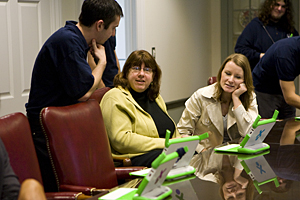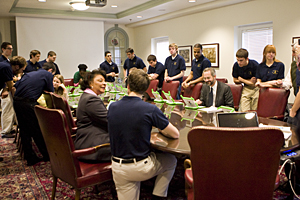
ADVERTISEMENT
- Rozovsky wins prestigious NSF Early Career Award
- UD students meet alumni, experience 'closing bell' at NYSE
- Newark Police seek assistance in identifying suspects in robbery
- Rivlin says bipartisan budget action, stronger budget rules key to reversing debt
- Stink bugs shouldn't pose problem until late summer
- Gao to honor Placido Domingo in Washington performance
- Adopt-A-Highway project keeps Lewes road clean
- WVUD's Radiothon fundraiser runs April 1-10
- W.D. Snodgrass Symposium to honor Pulitzer winner
- New guide helps cancer patients manage symptoms
- UD in the News, March 25, 2011
- For the Record, March 25, 2011
- Public opinion expert discusses world views of U.S. in Global Agenda series
- Congressional delegation, dean laud Center for Community Research and Service program
- Center for Political Communication sets symposium on politics, entertainment
- Students work to raise funds, awareness of domestic violence
- Equestrian team wins regional championship in Western riding
- Markell, Harker stress importance of agriculture to Delaware's economy
- Carol A. Ammon MBA Case Competition winners announced
- Prof presents blood-clotting studies at Gordon Research Conference
- Sexual Assault Awareness Month events, programs announced
- Stay connected with Sea Grant, CEOE e-newsletter
- A message to UD regarding the tragedy in Japan
- More News >>
- March 31-May 14: REP stages Neil Simon's 'The Good Doctor'
- April 2: Newark plans annual 'wine and dine'
- April 5: Expert perspective on U.S. health care
- April 5: Comedian Ace Guillen to visit Scrounge
- April 6, May 4: School of Nursing sponsors research lecture series
- April 6-May 4: Confucius Institute presents Chinese Film Series on Wednesdays
- April 6: IPCC's Pachauri to discuss sustainable development in DENIN Dialogue Series
- April 7: 'WVUDstock' radiothon concert announced
- April 8: English Language Institute presents 'Arts in Translation'
- April 9: Green and Healthy Living Expo planned at The Bob
- April 9: Center for Political Communication to host Onion editor
- April 10: Alumni Easter Egg-stravaganza planned
- April 11: CDS session to focus on visual assistive technologies
- April 12: T.J. Stiles to speak at UDLA annual dinner
- April 15, 16: Annual UD push lawnmower tune-up scheduled
- April 15, 16: Master Players series presents iMusic 4, China Magpie
- April 15, 16: Delaware Symphony, UD chorus to perform Mahler work
- April 18: Former NFL Coach Bill Cowher featured in UD Speaks
- April 21-24: Sesame Street Live brings Elmo and friends to The Bob
- April 30: Save the date for Ag Day 2011 at UD
- April 30: Symposium to consider 'Frontiers at the Chemistry-Biology Interface'
- April 30-May 1: Relay for Life set at Delaware Field House
- May 4: Delaware Membrane Protein Symposium announced
- May 5: Northwestern University's Leon Keer to deliver Kerr lecture
- May 7: Women's volleyball team to host second annual Spring Fling
- Through May 3: SPPA announces speakers for 10th annual lecture series
- Through May 4: Global Agenda sees U.S. through others' eyes; World Bank president to speak
- Through May 4: 'Research on Race, Ethnicity, Culture' topic of series
- Through May 9: Black American Studies announces lecture series
- Through May 11: 'Challenges in Jewish Culture' lecture series announced
- Through May 11: Area Studies research featured in speaker series
- Through June 5: 'Andy Warhol: Behind the Camera' on view in Old College Gallery
- Through July 15: 'Bodyscapes' on view at Mechanical Hall Gallery
- More What's Happening >>
- UD calendar >>
- Middle States evaluation team on campus April 5
- Phipps named HR Liaison of the Quarter
- Senior wins iPad for participating in assessment study
- April 19: Procurement Services schedules information sessions
- UD Bookstore announces spring break hours
- HealthyU Wellness Program encourages employees to 'Step into Spring'
- April 8-29: Faculty roundtable series considers student engagement
- GRE is changing; learn more at April 15 info session
- April 30: UD Evening with Blue Rocks set for employees
- Morris Library to be open 24/7 during final exams
- More Campus FYI >>
1:16 p.m., Dec. 17, 2009----University of Delaware computer science majors Aaron Reynolds and William Friedman stood beaming beside a tiny laptop computer. Its screen asked for your name in a box superimposed on the iconic image of George Washington crossing the Delaware River. Supplying one's name is no easy task for adults, as the keys on the neon green and white machine are so close together anyone with hands larger than a child's would have trouble.
But then, children are the consumers of the computer and the games that Reynolds, Friedman and their classmates created for these XO laptops, computers popularized by the One Laptop Per Child program.
This fall semester, 20 UD students enrolled in a Computer and Information Sciences course (CISC367) wrote XO laptop games customized for students at Chester Community Charter School (CCCS) in Chester, Pa. Every student in grades three through eight at CCCS is provided with an XO laptop.
The school works to empower students, who live in an area that has been in decline over the last 30 years. CCCS's Web site notes Chester's crime and poverty rates are among the highest in the state. Among the adult population, 31 percent have not completed high school and 12 percent are unemployed. The city has no supermarket, movie theater or bookstore.
The class paired UD students with four CCCS teachers, and tasked them with creating a game each teacher could use in the classroom. This week, the students showcased their work.
The group with which Reynolds and Friedman worked collaborated with an eighth grade history teacher at CCCS who wanted to integrate his students' computers into class work.
“Our program was designed to take the place of his paper quizzes,” said Reynolds. “So, it's one less thing for him to have to grade.”
Once the class completes the quiz, the program e-mails the results to the teacher.
“It keeps the kids interested and gives them something new to do, that they're probably looking forward to,” said Friedman.
CISC367 is a service learning course, focused on helping students develop real-world skills while performing community service.
Terry Harvey, assistant professor, and Lori Pollock, professor, both in the Department of Computer and Information Sciences, had taught an experimental course with the XO laptops in Winter Session 2009. A student in that class showed them a newspaper article detailing the donation of 1,400 XO laptops to CCCS by the school's benefactors, Vahan and Danielle Gureghian.
“We contacted (CCCS) and said, 'Would you like to work with us?'” Harvey said.
The relationship is mutually beneficial, he said. XO laptops use the computer programming language Python, a language not taught in other classes at the University. The professors believe the students developed both confidence and skills by tackling a new language outside the confines of a university classroom.
Harvey told his class, “You, in collaboration with a real person out in the real world, not a computer science professor, are going to design what your problem is and then you're going to have to figure out how to solve it.”
And solve it they did, providing four teachers with ready-to-use games. The students said a major consideration was ease of use for the teachers. The games allow the teachers to create new questions in programs they are familiar with, like Microsoft Word and upload those to Google Docs. The games automatically turn the documents into new quizzes.
“You're doing what you love to do in programming while at the same time it's benefitting somebody else,” junior Steven Alper, an information systems major, said. “It's not just, let's make a program because I have an idea and somebody's paying the money to do it.”
A $500,000 “Broadening Partnership in Computing” grant from the National Science Foundation funds the class and its continuation for at least five additional semesters. Next semester's class will build on this class' work and generate more programs for the teachers at CCCS.
Article by Andrea Boyle
Photos by Ambre Alexander



